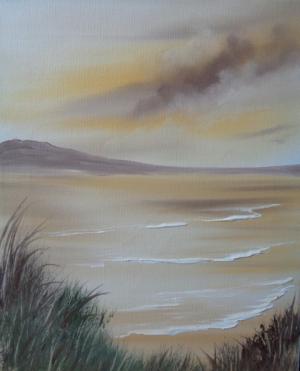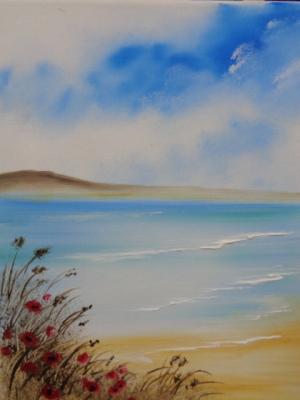How to Guides
The Business of Art
Getting Started
So, you're an artist and you do art…….but are you in business? The short answer is YES…if you offer any of your art for sale.
So what does this mean…what are the legalities involved in selling the art you produce?? Is it all too complicated, making you want to run for the hills, or lie down in a darkened room?
Well, actually, it's not that complicated. Not convinced? Well here's a short guide on what you need to do to make sure you stay on the right side of the Inland Revenue J
- The first thing I would recommend you do is to approach your local Enterprise Agency. In Scotland it is known as the Business Gateway
http://www.bgateway.com/
In England and Wales, it is known as the Business Link
http://www.businesslink.gov.uk/
On these sites, you will find details of how to attend a free “start-up” seminar, be allocated your own business advisor to help with any queries you may have in the early days, and access grants which are available to new businesses. There are often grants for IT, Camera equipment, Broadband access etc, although these change from time to time, so always check to see whats available.
- Within 3 months of starting to trade, you need to inform the Inland Revenue. This can be done on the telephone, you can phone the Inland Revenue on 08459 15 45 15 to register or you can fill in the form online and post it to them. They are not as scary as you might think….quite the opposite, actually….I have always found them to be very helpful and willing to advise you. However, failing to register as self-employed will land you with an automatic £100 fine…so best to do it within 3 months of setting up.
- Now to the question…..am I self-employed, or not. You may already have a job as an employee, elsewhere, and want to sell your art as an adjunct to your paid employment. This is entirely possible and in this instance, you would remain an employee for your paid job, but also be registered as self-employed for your “art business”.
- Once you have registered, the next step is to set yourself up with some form of recording system, to keep track of all your business related outgoings (known as “Expenses”) and your sales (known as “Income”). There are lots of ways to do this….from a very basic templated “income/Expense” book which you fill in with a pen, to software which not only lets you record your income & expenses, but also gives you reports, calculates profits and generally makes life a whole lot easier for you. One of the basic, easy to use programmes is Microsoft Money, but there are lots of others such as Quicken, Sage etc. if you are just starting off and are not employing anyone (i.e. you are a sole trader), I would recommend starting with something like Microsoft Money.
- At this stage, I would also approach a bank about opening up a separate business account – (see point 9)…this will make it easier to keep your accounts straight – you make business purchases (for stock, equipment, services etc) through this account and also pay any money from sales into this account. By keeping all your business related finances in the one place and separate from your personal finances, you will find it much easier to reconcile (match up) your statements from this account with all your receipts etc, to make your income/expenses recording more accurate.
- The next step is to learn what items are properly considered to be “business expenses”. For the definitive guide, then an accountant would advise you. However if you are not expecting to be earning enough to justify the expense of an accountant, and want to keep your own books, then you will need to learn what is allowable and what is not. For this, I would recommend printing out a copy of
http://www.hmrc.gov.uk/startingup/working-for-yourself.pdf
for your guidance. You can also attend some of the free seminars held by the Inland Revenue, to help and guide new business start-ups.
It is also worth noting that any business expenses you incur for the period of 6 months prior to setting up (i.e. your "start-up expenses" can be included in your first set of accounts, and offset against any sales (i.e. effectively reducing the amount of profit you make) providing they are legitimate, allowable expenses, backed up by receipts. For example, you purchase paints, brushes, canvases, easle etc in order to start painting - this will obviously happen BEFORE you offer your first painting for sale (i.e. begin trading), therefore, providing these purchases are within the 6 months prior to you begining trading, then you can include them as expenses in your first set of accounts.
- Now, what you need to do is sort out some form of filing/storage system for your receipts….because you will need to keep EVERYTHING related to your business accounts – and you will need to keep them for a minimum of 5 years, in case of an inspection. I keep my receipts in a box file, with a hard copy of my end of year accounts (remember the reports from your software?….yes…one of those), and a copy of the self-assessment form which I have submitted…… one new file for each tax year.
- At the end of the tax year, you have to decide whether to pay an accountant to submit your tax returns, or whether to do this yourself. Filling in the online tax self-assessment form is not difficult. You need to register for this service in advance, as they issue you with a username and password – so don't leave it to the last minute. Follow the form, filling in any relevant details that you can….if you are employed elsewhere, you will need your latest P60 and you will also need a copy of your income/expense/profit for your art. The Inland Revenue are happy to help you if you get stuck, but it's not too difficult. If you submit your self-assessment forms by the deadline, the Inland Revenue will calculate how much tax you owe (if you are in profit), or how much tax relief you may offset against future profits (if you have made a loss).
- And that's it, really…except for one last thing…..my personal recommendation would be to join the FSB – this is the Federation of Small Businesses - http://www.fsb.org.uk/
They are a not-for-profit organisation whose aim is to represent the best interests of small businesses throughout the UK. There are lots of member benefits, including totally FREE business banking (for life) with the Co-Operative bank – only available to FSB members. They also have a free legal advice service for members. Well worth the annual subscription (which is, after all, an allowable business expense )
- Now…all you have to do is get one with the business of selling your work








